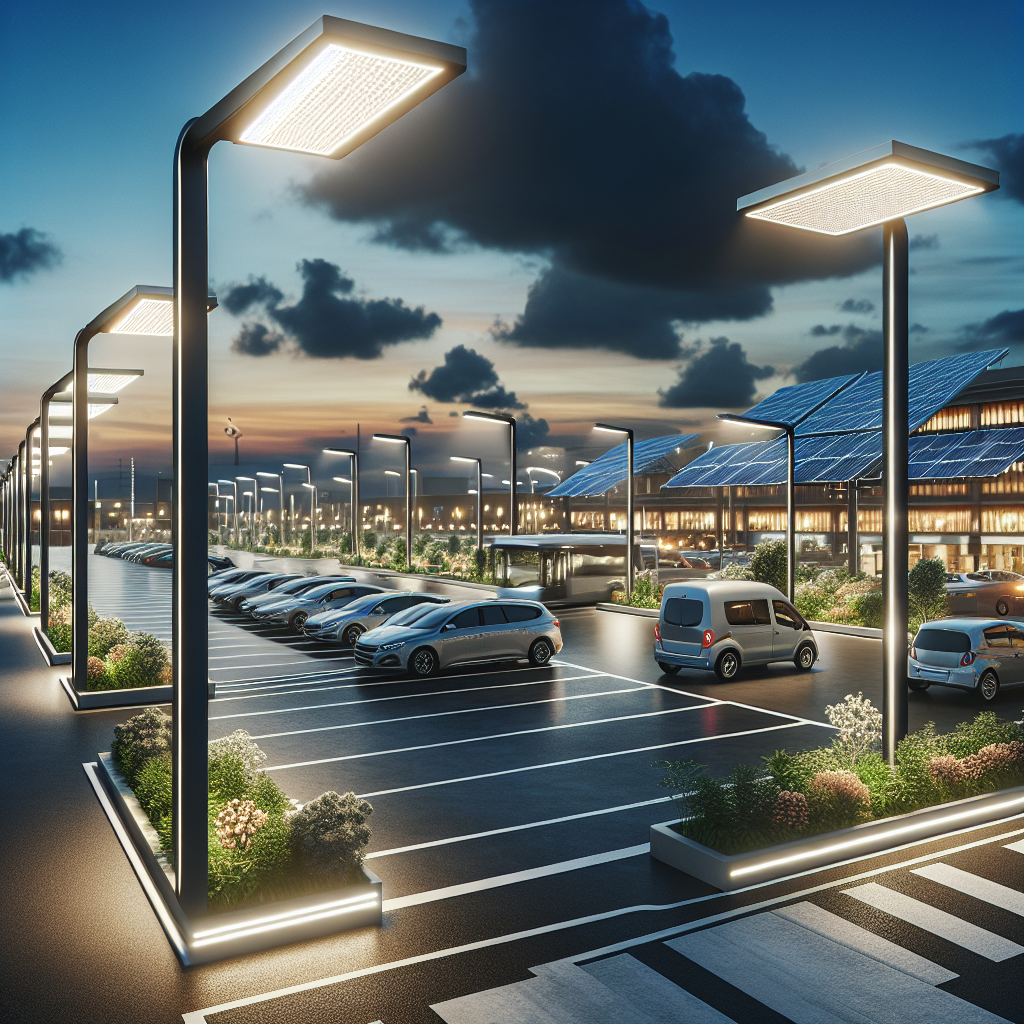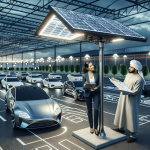Frequently Asked Questions about Solar Carpark Lights
-
Table of Contents
Frequently Asked Questions (FAQs) about Solar Carpark Lights provide essential information for individuals and organizations considering the installation of solar-powered lighting solutions in parking areas. These FAQs address common inquiries regarding the functionality, benefits, installation, maintenance, and cost-effectiveness of solar carpark lights. By offering clear and concise answers, they help users understand how solar lighting can enhance safety, reduce energy costs, and contribute to environmental sustainability. Whether you are a property manager, business owner, or simply interested in green technology, these FAQs serve as a valuable resource for making informed decisions about solar carpark lighting systems.
Common Misconceptions About Solar Carpark Lights
Solar carpark lights have become increasingly popular as a sustainable and cost-effective solution for illuminating parking areas. However, despite their growing adoption, several misconceptions persist about their functionality, efficiency, and reliability. Addressing these misconceptions is crucial for potential users to make informed decisions.
One common misconception is that solar carpark lights are not as bright as traditional lighting systems. This belief stems from early iterations of solar lighting technology, which indeed had limitations in terms of brightness and efficiency. However, advancements in photovoltaic cells and LED technology have significantly improved the performance of solar carpark lights. Modern solar lights can now provide illumination levels comparable to, or even exceeding, those of conventional lighting systems. Furthermore, the use of high-efficiency LEDs ensures that the light output is both bright and consistent, dispelling the myth that solar lights are inherently dim.
Another prevalent misconception is that solar carpark lights are unreliable, particularly in regions with less sunlight. While it is true that solar lights rely on sunlight to charge their batteries, modern systems are designed to function efficiently even in less-than-ideal conditions. Many solar carpark lights are equipped with high-capacity batteries and advanced energy management systems that store excess energy generated during sunny periods. This stored energy can then be used during cloudy days or at night, ensuring continuous operation. Additionally, some systems incorporate hybrid technology, allowing them to draw power from the grid when solar energy is insufficient, thereby enhancing their reliability.
The belief that solar carpark lights are prohibitively expensive is another misconception that needs to be addressed. While the initial investment for solar lighting systems can be higher than that for traditional lighting, the long-term savings are substantial. Solar carpark lights eliminate the need for trenching and wiring, which are significant cost factors in conventional lighting installations. Moreover, they incur minimal operational costs since they harness free solar energy. Over time, the reduction in electricity bills and maintenance expenses can offset the initial investment, making solar carpark lights a cost-effective solution in the long run.
Some individuals also harbor the misconception that solar carpark lights require extensive maintenance. In reality, these systems are designed to be low-maintenance. The primary components, such as solar panels and LEDs, have long lifespans and are built to withstand harsh environmental conditions. Routine maintenance typically involves periodic cleaning of the solar panels to ensure optimal energy absorption and occasional checks on the battery and lighting fixtures. Compared to traditional lighting systems, which may require frequent bulb replacements and electrical inspections, solar carpark lights offer a more hassle-free maintenance experience.
Lastly, there is a misconception that solar carpark lights are not environmentally friendly due to the materials used in their production. While it is true that the manufacturing process involves some environmental impact, the overall ecological footprint of solar carpark lights is significantly lower than that of conventional lighting systems. Solar lights reduce greenhouse gas emissions by utilizing renewable energy and decreasing reliance on fossil fuels. Additionally, many manufacturers are now adopting sustainable practices and using recyclable materials to further minimize environmental impact.
In conclusion, addressing these common misconceptions about solar carpark lights is essential for fostering a better understanding of their benefits and capabilities. Modern solar lighting systems are bright, reliable, cost-effective, low-maintenance, and environmentally friendly. By dispelling these myths, potential users can make more informed decisions and contribute to a more sustainable future.
Installation And Maintenance FAQs For Solar Carpark Lights

When considering the installation and maintenance of solar carpark lights, several frequently asked questions arise, reflecting the growing interest in sustainable and cost-effective lighting solutions. One of the primary concerns is the ease of installation. Solar carpark lights are generally designed for straightforward installation, often requiring minimal groundwork. Unlike traditional lighting systems, they do not necessitate extensive wiring or trenching, which significantly reduces installation time and labor costs. Typically, the process involves securing the light poles, mounting the solar panels, and ensuring proper alignment to maximize sunlight exposure.
Another common question pertains to the optimal placement of solar carpark lights. For maximum efficiency, it is crucial to position the solar panels in areas that receive abundant sunlight throughout the day. Shaded locations or areas obstructed by buildings or trees can impede the panels’ ability to charge fully, thereby diminishing the lights’ performance. Additionally, the spacing between lights should be carefully planned to ensure uniform illumination across the carpark, enhancing safety and visibility for users.
Maintenance is another critical aspect that potential users often inquire about. Solar carpark lights are designed to be low-maintenance, which is one of their most appealing features. However, periodic checks are essential to ensure optimal performance. Cleaning the solar panels regularly to remove dust, bird droppings, and other debris is necessary to maintain their efficiency. Furthermore, inspecting the battery and electrical components periodically can help identify and address any issues before they escalate. Most solar carpark lights come with durable, weather-resistant materials, but it is still advisable to check for any signs of wear and tear, especially after severe weather conditions.
Battery life and replacement are also frequent topics of concern. The batteries used in solar carpark lights typically have a lifespan of several years, depending on the quality and usage patterns. It is important to choose high-quality batteries to ensure longevity and consistent performance. When the time comes to replace the batteries, the process is usually straightforward and can be done without specialized tools or expertise. Regular monitoring of battery performance can help predict when a replacement might be necessary, allowing for timely maintenance without disrupting the lighting system.
Another pertinent question is about the reliability of solar carpark lights in various weather conditions. Modern solar lighting systems are designed to withstand a wide range of environmental factors, including rain, snow, and extreme temperatures. They are equipped with robust materials and advanced technology to ensure consistent performance. However, prolonged periods of overcast weather can affect the charging efficiency of the solar panels. To mitigate this, many systems are designed with energy storage capabilities that allow them to function for several days without direct sunlight.
Lastly, the cost-effectiveness of solar carpark lights is a significant consideration. While the initial investment may be higher compared to traditional lighting systems, the long-term savings are substantial. Solar carpark lights eliminate the need for electricity from the grid, resulting in lower utility bills. Additionally, the reduced maintenance requirements and longer lifespan of solar lighting systems contribute to their overall cost-effectiveness. Over time, the savings on energy and maintenance can offset the initial installation costs, making solar carpark lights a financially viable option.
In conclusion, the installation and maintenance of solar carpark lights involve several considerations, from placement and installation ease to maintenance routines and cost-effectiveness. By addressing these frequently asked questions, potential users can make informed decisions and fully leverage the benefits of solar carpark lighting systems.
Benefits And Efficiency Of Solar Carpark Lights
Solar carpark lights have become increasingly popular as a sustainable and efficient lighting solution for parking areas. One of the primary benefits of these lights is their reliance on solar energy, which is a renewable and inexhaustible resource. By harnessing the power of the sun, solar carpark lights significantly reduce the dependency on conventional electricity sources, thereby lowering energy costs and minimizing the carbon footprint. This shift towards renewable energy is not only environmentally friendly but also economically advantageous in the long run.
In addition to their environmental benefits, solar carpark lights are highly efficient. They are designed with advanced photovoltaic cells that convert sunlight into electrical energy with remarkable efficiency. This energy is stored in batteries, allowing the lights to function even during cloudy days or at night. The integration of energy-efficient LED bulbs further enhances their performance, as LEDs consume less power while providing bright and consistent illumination. Consequently, solar carpark lights ensure that parking areas remain well-lit and secure, regardless of weather conditions.
Moreover, the installation of solar carpark lights is relatively straightforward and cost-effective. Unlike traditional lighting systems that require extensive wiring and trenching, solar lights are typically standalone units. This means they can be installed with minimal disruption to the existing infrastructure. The absence of wiring also reduces the risk of electrical hazards, making solar carpark lights a safer option. Additionally, the maintenance requirements for these lights are minimal, as they are designed to withstand harsh weather conditions and have a long operational lifespan.
Another significant advantage of solar carpark lights is their adaptability. They can be easily integrated into various settings, from small residential parking lots to large commercial complexes. This versatility makes them an ideal choice for a wide range of applications. Furthermore, many solar carpark lights come equipped with smart features such as motion sensors and remote control capabilities. These features enhance their functionality by allowing for automatic adjustments in lighting levels based on the presence of vehicles or pedestrians, thereby optimizing energy usage.
The efficiency of solar carpark lights is also evident in their ability to operate independently of the grid. This independence ensures that parking areas remain illuminated even during power outages, providing an added layer of security and convenience. In areas prone to frequent power disruptions, this feature can be particularly beneficial. Additionally, the use of solar energy aligns with global efforts to promote energy independence and reduce reliance on fossil fuels.
While the initial investment in solar carpark lights may be higher compared to traditional lighting systems, the long-term savings and benefits far outweigh the costs. The reduction in energy bills, coupled with the minimal maintenance expenses, results in significant financial savings over time. Moreover, many governments and organizations offer incentives and rebates for the installation of solar lighting systems, further offsetting the initial costs.
In conclusion, the benefits and efficiency of solar carpark lights make them a compelling choice for modern parking solutions. Their reliance on renewable energy, coupled with their high efficiency, ease of installation, and adaptability, positions them as a sustainable and cost-effective alternative to traditional lighting systems. As the world continues to prioritize environmental sustainability and energy efficiency, the adoption of solar carpark lights is likely to increase, contributing to a greener and more sustainable future.
Read more about Solar Carpark Lights:
- Introduction to Solar Carpark Lights
- Types of Solar Carpark Lights
- Factors to Consider when Choosing Solar Carpark Lights
- Installation and Maintenance of Solar Carpark Lights
- Top Brands in the Solar Carpark Light Industry
- Innovative Features of Solar Carpark Lights
- Case Studies: Successful Implementation of Solar Carpark Lights
- Practical Applications of Solar Carpark Lights
- Future Developments in Solar Carpark Lights









